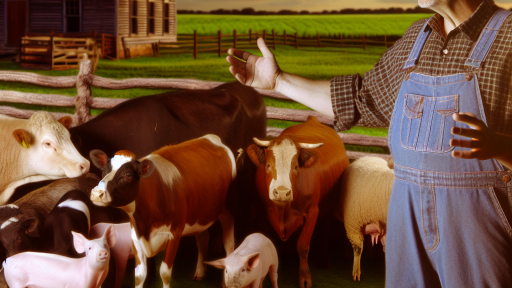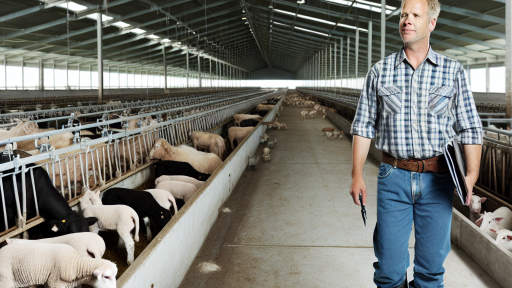Understanding Goat Parasites
Types of Goat Parasites
Goats are susceptible to various parasites.
Common internal parasites include gastrointestinal nematodes and coccidia.
External parasites include lice, mites, and ticks.
Each parasite type affects goats differently, impacting their health and productivity.
Life Cycles of Common Parasites
Understanding parasite life cycles aids effective control.
Gastrointestinal nematodes have a direct life cycle.
They thrive in warm, moist environments.
Coccidia, on the other hand, involve a two-host life cycle.
External parasites often reproduce quickly, exacerbating infestations.
Signs of Parasite Infestations
Producers should watch for clinical signs of parasite infestations.
Poor weight gain or weight loss can indicate a problem.
Other signs include lethargy and dull coats.
Additionally, diarrhea and anemia can signal serious infestations.
Preventive Measures
Implementing preventive measures is crucial to control parasites.
Regular deworming schedules are vital for internal parasite management.
Transform Your Agribusiness
Unlock your farm's potential with expert advice tailored to your needs. Get actionable steps that drive real results.
Get StartedCropping management can help reduce exposure to parasites.
Maintaining a clean living environment supports goat health.
Moreover, rotating pastures can minimize parasite loads.
Monitoring and Treatment Options
Monitoring is essential for effective parasite control.
Producers should conduct regular fecal examinations.
This practice helps assess parasite levels and treatment efficacy.
Different treatment options exist for various parasite types.
Seek veterinary advice for tailored medication plans.
Ensure adherence to withdrawal times when using medications.
Signs and Symptoms of Parasitic Infections in Goats
Common Symptoms
Goats with parasitic infections often exhibit weight loss.
Additionally, you may notice a decrease in feed intake.
Another common sign is poor coat condition.
Moreover, infested goats might appear lethargic or weak.
In severe cases, you might observe swelling in the jaw or underneath the eyes.
Gastrointestinal Symptoms
Gastrointestinal parasites can cause diarrhea in goats.
Look for signs of bloody or watery stools.
Some goats may also have abdominal discomfort.
They might show signs of straining or discomfort while defecating.
Behavioral Changes
Infected goats might exhibit unusual behaviors.
For instance, they may isolate themselves from the herd.
Additionally, they might frequently rub their bodies against fences or trees.
Monitoring Health
Consistent monitoring is crucial for early detection.
Check for changes in eating habits regularly.
Also, observe their social interactions within the herd.
Showcase Your Farming Business
Publish your professional farming services profile on our blog for a one-time fee of $200 and reach a dedicated audience of farmers and agribusiness owners.
Publish Your ProfilePerform regular health assessments to identify any abnormalities.
Importance of Fecal Sampling and Microscopic Examination
Understanding Fecal Sampling
Fecal sampling is a critical first step in parasite control for goats.
This process helps identify the type and number of parasites present in your herd.
By collecting fecal samples regularly, farmers can monitor parasite burden efficiently.
Consistency in sampling supports better decision-making regarding treatments.
Microscopic Examination Explained
Microscopic examination allows for a precise identification of parasites in fecal samples.
This analysis reveals specific species, aiding targeted treatment strategies.
Veterinarians and certified technicians typically perform these examinations.
Moreover, they can detect eggs and larvae that are otherwise invisible to the naked eye.
The Role of Fecal Egg Counts
Fecal egg counts provide quantitative data about the number of parasite eggs in the samples.
This information is crucial for understanding the severity of an infestation.
It also helps determine the effectiveness of any treatments administered.
Regular monitoring of fecal egg counts ensures proactive management of parasitic infections.
Benefits of Regular Testing
Regular testing leads to healthier goats and more productive herds.
It enables farmers to implement timely and effective control measures.
Additionally, this practice reduces reliance on medications, promoting sustainable practices.
Farmers can track trends over time, adjusting their management strategies as needed.
Delve into the Subject: Managing Inbreeding in Livestock Populations
Integrated Pest Management Strategies for Goat Parasite Control
Understanding Integrated Pest Management
Integrated Pest Management (IPM) emphasizes a holistic approach to controlling parasites in goats.
This method combines multiple strategies to reduce parasite populations effectively.
IPM aims to minimize reliance on chemical treatments.
Furthermore, it promotes sustainable farming practices.
Monitoring Goat Health
Regular health assessments are crucial to successful parasite control.
Conduct fecal egg counts to monitor parasite levels.
Use this data to inform treatment decisions.
Additionally, observe goats for signs of illness.
Early detection can prevent serious infestations.
Implementing Biological Control Methods
Biological control uses natural enemies to manage parasites.
Beneficial nematodes can target specific parasite larvae.
Furthermore, employing certain insect species can help control fly populations.
Encourage wildlife that naturally predates on parasites.
For instance, poultry can eat parasite larvae in pasture areas.
Utilizing Cultural Practices
Adjusting management practices can reduce parasite exposure.
Rotational grazing prevents excess parasite buildup in pastures.
Consider maintaining optimal pasture health for best results.
Avoid overstocking to limit parasite transmission among goats.
Timing is essential; grazing regimes must be designed appropriately.
Choosing Appropriate Anthelmintics
Effective use of dewormers is a key component of parasite control.
Rotate dewormers to prevent resistance development.
Use targeted treatments based on fecal analysis results.
Showcase Your Farming Business
Publish your professional farming services profile on our blog for a one-time fee of $200 and reach a dedicated audience of farmers and agribusiness owners.
Publish Your ProfileAlways follow the recommended dosages and administration guidelines.
Consult a veterinarian for specific product recommendations.
Incorporating Nutritional Management
A balanced diet supports overall goat health.
Good nutrition strengthens the immune system against parasites.
Ensure that goats receive essential vitamins and minerals.
Work with a nutritionist if necessary to design effective feeding programs.
Educational Outreach and Training
Farmers should stay informed about parasite control strategies.
Participate in workshops and training sessions on IPM.
Networking with other goat producers can also provide valuable insights.
Utilize resources from agricultural extensions for additional support.
Education empowers farmers to make informed decisions.
Discover More: Proper Loading Techniques for Livestock Vehicles
The Role of Nutrition in Enhancing Goat Immunity Against Parasites
Understanding Goat Nutrition
Nutrition significantly impacts goat health and immunity.
Balanced diets provide essential nutrients for growth and reproduction.
Furthermore, proper nutrition supports the overall well-being of goats.
Key Nutrients for Immunity
Vitamins and minerals play a critical role in immune function.
Vitamin A promotes healthy mucosal surfaces.
Vitamin E acts as an antioxidant to protect cells.
Zinc is essential for the development of immune cells.
Additionally, selenium helps reduce oxidative stress.
Protein’s Importance
Protein is vital for building and repairing tissues.
It also supports the production of antibodies.
High-quality protein sources include legumes and grains.
Goats require adequate protein intake to combat parasitic infections.
Fiber and Digestive Health
Fiber is crucial for maintaining healthy digestion.
Forage-rich diets promote gut health and nutrient absorption.
Healthy gut flora can improve the immune response to parasites.
Hydration and Its Effects
Fresh water is essential for all metabolic processes.
Dehydration can weaken the immune system.
Ensure goats have constant access to clean, fresh water.
Feed Management Strategies
Regularly assess and adjust feeding practices as needed.
Utilize rotational grazing to manage pasture health.
Supplement feed with minerals and vitamins when necessary.
Monitor goat body condition to ensure adequate nutrition.
Effective Nutritional Practices
Proper nutrition boosts the immune system against parasites.
Implementing effective feeding strategies enhances overall goat health.
Ultimately, this leads to improved productivity and well-being.
Learn More: Genetic Selection Techniques for Livestock Management

Chemical and Herbal Deworming Options: Pros and Cons
Chemical Deworming Options
Chemical dewormers are commonly used in goat farming.
They offer rapid and effective results against various parasites.
Showcase Your Farming Business
Publish your professional farming services profile on our blog for a one-time fee of $200 and reach a dedicated audience of farmers and agribusiness owners.
Publish Your ProfileExamples include ivermectin and fenbendazole.
These products are usually easy to administer.
However, their frequent use can lead to resistance.
Farmers should rotate chemical options to minimize resistance risk.
Additionally, some chemicals can have negative environmental impacts.
Careful evaluation is necessary before using chemical treatments.
Advantages of Chemical Dewormers
- Quick elimination of parasites.
- Proven effectiveness with scientific backing.
- Convenient application methods.
Disadvantages of Chemical Dewormers
- Potential for developing parasite resistance.
- Possible residue in meat and milk.
- Environmental concerns regarding chemicals.
Herbal Deworming Options
Herbal dewormers are gaining popularity among goat farmers.
These products use natural ingredients for parasite control.
Examples include garlic, pumpkin seeds, and diatomaceous earth.
They tend to have fewer side effects compared to chemicals.
Farmers appreciate the holistic approach of herbal treatments.
However, they may not be as effective in severe cases.
Consistency and proper dosage are crucial for herbal remedies.
Advantages of Herbal Dewormers
- Lower risk of chemical residues in meat and milk.
- Potentially better for animal welfare.
- Environmental sustainability with natural ingredients.
Disadvantages of Herbal Dewormers
- Less scientific validation on effectiveness.
- Slow acting compared to chemical options.
- Variability in potency and composition.
Choosing the Right Option
Choosing between chemical and herbal dewormers requires consideration.
Farmers should assess the severity of the parasite infestation.
The age and health status of the goats is also crucial.
Consulting with a veterinarian can guide proper treatment choices.
Ultimately, a balanced approach may yield the best results.
Explore Further: Selecting the Right Sheep for Your Farm
Implementing Rotation Grazing to Reduce Parasite Load
Understanding Rotation Grazing
Rotation grazing involves moving goats between different grazing areas.
This practice disrupts the life cycle of parasites.
Consequently, it helps in minimizing parasite infestations.
Goats can graze fresh pastures while allowing previously used areas to recover.
Benefits of Rotation Grazing
Rotation grazing enhances pasture health significantly.
It prevents overgrazing and promotes new growth of vegetation.
Additionally, rotating grazing areas reduces parasite exposure.
Goats have fewer opportunities to ingest larvae in clean pastures.
Implementing a Rotation Grazing System
Begin by dividing your pasture into several sections.
Each section should provide enough forage for the goats.
Next, create a grazing schedule that allows adequate recovery time.
For instance, allow at least three weeks between grazing in a section.
This recovery period helps break the parasite life cycle.
Monitoring the Grazing Process
Regularly observe the condition of your pastures.
Look for signs of overgrazing or underutilization.
Adjust your grazing schedule as needed to maintain balance.
Always ensure the goats have access to clean water and shelter.
Integrating Other Management Practices
Incorporate diverse grazing species alongside goats.
Mixing species can further disrupt parasite cycles.
Consider using herbal dewormers as an additional measure.
These can complement rotation grazing strategies effectively.
Showcase Your Farming Business
Publish your professional farming services profile on our blog for a one-time fee of $200 and reach a dedicated audience of farmers and agribusiness owners.
Publish Your ProfileFinally, keep veterinary care a priority to monitor health regularly.
Monitoring and Record Keeping to Track Parasite Management Effectiveness
Importance of Monitoring
Monitoring goat health is crucial for effective parasite control.
Regular checks help identify signs of parasite infestations early.
This proactive approach allows for timely interventions.
Setting Up a Record Keeping System
Establishing a meticulous record-keeping system is essential.
Record key information about individual goats to track their health.
Include details such as deworming dates and medication used.
Also note any signs of worm burdens and health changes.
Effective Tools for Monitoring
Utilize specific tools to aid in monitoring goat health.
Fecal egg count tests provide accurate insights into parasite levels.
Blood tests can also reveal underlying health issues.
Consider using apps designed for livestock management.
Establishing Baselines
Establish baselines for each goat’s health parameters.
These baselines help identify deviations over time.
Regular assessments enable you to adapt management practices.
Review and Adjust Management Practices
Regularly review monitoring records and test results.
Data-driven decisions allow for targeted parasite control strategies.
Adjust management practices based on recorded outcomes.
This continuous feedback loop enhances overall herd health.
Engaging with Professionals
Collaborate with veterinarians for expert guidance.
Professionals can offer insights into effective monitoring techniques.
They may also recommend suitable deworming protocols.
Utilizing professional advice enhances effectiveness in parasite management.
Additional Resources
Tipsheet: Organic Manage- ment of Internal and External Livestock …
Sustainable Non-synthetic Gastrointestinal Parasites Control in …




